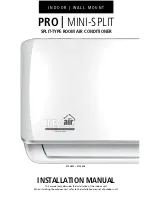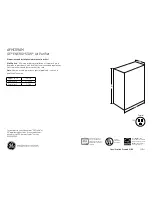
–122–
Checking code
Meaning, detecting method
Cause
Checking method & Countermeasure
1301
1302
Low pressure
abnoramlity
High pressure
abnoramlity 1
(Outdoor unit)
When starting from the stop mode
for the first time, (if at the start of bind
power transmission, the end of bind
power transmission, and in the mode
when the thermostat goes OFF im-
mediately after the remote control
goes ON, the following compressor
start time is included), if the low pres-
sure pressure sensor before start-
ing is at 1.0 kg/cm
2
G (0.098MPa),
operation stops immediately.
1. When press. sensor detects
28kg/cm
2
G (2.47MPa) or more
during operations (the first
time), outdoor unit stops once,
mode is changed to restart
mode after 3 minutes, then the
outdoor unit restarts.
2. When 30kg/cm
2
G (2.94MPa) or
more pressure is detected
again (the second time) within
30 minutes after stop of outdoor
unit,error stop is observed with
code No. “1302” displayed.
3. When 28kg/cm
2
G (2.47MPa) or
more pressure is detected 30
or more minutes after stop of
outdoor unit, the detection is re-
garded as the first time and the
process shown in 1 is observed.
4. 30 minutes after stop of outdoor
unit is intermittent fault check
period with LED displayed.
5. Error stop is observed immediately
when press. switch (30 kg/
cm
2
G (2.94 MPa)) operates in
addition to pressure sensor.
1) Internal pressure is dropping due
to a gas leak.
2) The low pressure pressure sensor
is defective.
3) Insulation is torn.
4) A pin is missing in the connector,
or there is faulty contact.
5) A wire is disconnected.
6) The control board’s low pressure
pressure sensor input circuit is de-
fective.
1) Poor operations of indoor LEV.
2) Poor operations of outdoor LEV1
(PUHY).
3) Poor operations of BC controller
LEV:
Heating-only, heating-principal:
LEV3
Defrost:
LEV3
4) Poor operations of BC controller
SVM:
Cooling-only, defrost
5) Poor operations of BC controller
SVA:
Cooling-only, cooling-main
6) Poor operations of BC controller
SVB:
Heating-only, heating-main
7) Solenoid valve SV (3 ~ 6) trouble
(PURY). SV3 ~ 4 (PUHY-P)
Cooling-only, cooling-main
8) Setting error of connection address.
9) Poor operations of ball valve.
10)Short cycle of indoor unit.
11)Clogging of indoor unit filter.
12)Fall in air volume caused by dust
on indoor unit fan.
13)Dust on indoor unit heat exchanger.
14)Indoor unit fan block, motor trouble.
9)~14) : Rise in high pressure
caused by lowered condensing
capacity in heating-only and
heating-principal operation.
15)Short cycle of outdoor unit.
16)Dust on outdoor unit heat exchanger.
17)Outdoor unit fan block, motor trou-ble,
poor operations of fan controller.
15)~17):Rise in high press.
caused by lowered condensing
capacity in cooling-only and
cooling-pincipal operation.
18)Poor operations of solenoid valves
SV1, 2 (Bypass valves (SV1, 2) can
not control rise in high pressure).
19)Thermistor trouble (TH2, TH5, TH6).
20)Pressure sensor trouble.
21)Control circuit board thermistor
trouble, press. sensor input circuit
trouble.
Refer to the item on judging low pres-
sure pressure sensor failure.
Check operations status by actually
performing cooling or heating opera-
tions.
Cooling :
Indoor LEV
LEV1 (PUHY)
LEV1, 3 (BC)
SVM SVA (BC)
SV3~6 (PURY)
SV3~4 (PUHY-P)
Heating :
Indoor LEV
LEV3 (BC)
SVB (BC)
See Trouble check of LEV and sole-
noid valve.
Check address setting of indoor unit
connector.
Confirm that ball valve is fully open-ed.
Check indoor unit and take measures
to trouble.
Check outdoor unit and take measures
to trouble.
Check outdoor unit fan
See Trouble check of outdoor unit
fan.
See Trouble check of solenoid valve.
Check resistance of thermistor.
Check Trouble check of pressure
sensor.
Check inlet temperature and press. of
sensor with LED monitor.
+0
-1.5
+0
-1.5
















































